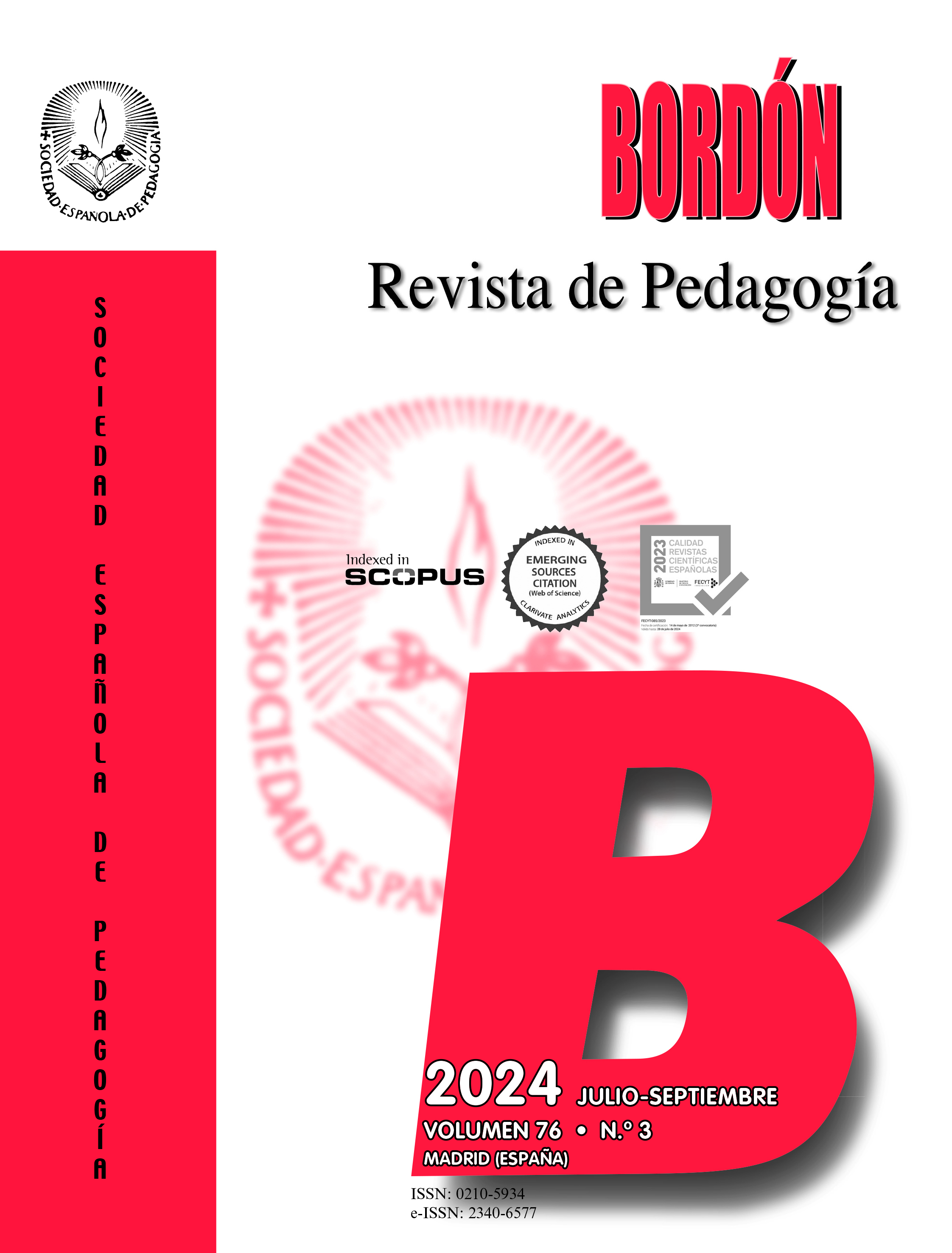Socio-educational care with unaccompanied foreign minors
Main Article Content
Abstract
INTRODUCTION. Discussions regarding the socio educational care of unaccompanied minors who emigrate are still scarce. In Catalonia, the prevailing care and intervention model is the educational aid model, based at a theoretical level on the principles of normalization-responsibility of the people involved, and translated for practical purposes into a work with a double logic: community and individual. METHOD. Based on this, from a descriptive-comprehensive study based on interrogative techniques, we delve into the modalities and areas of intervention that are developed in all the centres, units, or services where these young people are attended, from the triple perspective of the professional educators, the young people who have migrated to Barcelona and the management of the centres. RESULTS. The results show that, despite explicit attempts to respect educational principles, there is a disparity of criteria depending on the type of centre. However, in all of them the educational bond plays a fundamental role in socio-educational action for inclusion, which does not exempt the need to continue strengthening co-responsibility with the administrations, the participation of young people in neighbourhood resources —especially in training— and their rooting in the territory. DISCUSSION. The findings point to the need to promote solid ties, facilitating the relationship betweenyoung people andtheir families, from a multidimensional approach that encompasses educational, emotional, social and cultural aspects, and that promotes the participation and rooting of these young people in the community.
Downloads
Article Details

This work is licensed under a Creative Commons Attribution-NonCommercial 4.0 International License.
References
Benomar, K. y Pàmies, J. (2022). Un acercamiento a la transición a la mayoría de edad de los jóvenes migrantes extutelados: entre la emancipación y las frustraciones. Educació Social. Revista d’Intervenció Socioeducativa, 80, 155-173.
Chávez, L. y Menjívar, C. (2010). Children without Borders: A Mapping of the Literature on Unaccompanied Migrant Children to the United States. Migraciones Internacionales, 5(3), 71-111.
Corti, F. (2017). La contemporaneidad de la relación pedagógica: un estudio de casos en un aula de secundaria [Tesis Doctoral, Universitat de Barcelona]. TDX. http://hdl.handle.net/10803/586093
Cuenca, M. (2000). Ocio humanista: dimensiones y manifestaciones actuales del ocio. Universidad de Deusto.
Del Valle, J. F., Bravo, A., Martínez, M. y Santos, I. (2012). Estándares de calidad en acogimiento residencial EQUAR. Ministerio de Sanidad, Servicios Sociales e Igualdad.
Gimeno, C. (2018). Retos de la acogida residencial a menores que migran solos: hacia un Trabajo Social transnacional. Cuadernos de Trabajo Social, 31(1), 95-108. http://dx.doi.org/10.5209/CUTS.56005
Giró, J. (2011). Las amistades y el ocio de los adolescentes, hijos de la inmigración. Papers: Revista de Sociología, 96(1)
Kholi, R. K. S. (2006). The Sound Of Silence: Listening to What Unaccompanied Asylum-seeking Children Say and Do Not Say. The British Journal of Social Work, 36(5), 707-721. https://doi.org/10.1093/bjsw/bch305
Lalayants, M. y Prince, J. (2014) Loneliness and Depression or Depression-Related Factors Among Child Welfare-Involved Adolescent Females. Child and Adolescent Social Work Journal, 32(2), 167-176.
López-Lajusticia, G. (2022). Qué significa acompañar a la infancia y a la adolescencia desde el acogimiento residencial. RES, Revista de Educación Social, 34, 10-34.
López-Reillo, P. (2011). Jóvenes de África reinventado su vida. Menores extranjeros no acompañados salvando fronteras. Tenerife, Área de Empleo, Desarrollo Económico, Comercio y Acción Exterior.
Majorano, M., Musetti, A., Brondino, M. y Corsano, P. (2015). Loneliness, Emotional Autonomy and Motivation for Solitary Behavior During Adolescence. Journal of Child and Family Studies, 24, 3436-3447.
Marzo, M. (2009). Educador social i infancia en situación de risc. Departament d’Acció Social i Ciutadania, Secretaria d’Infancia i Adolescencia.
Maxwell, J. A. (2013). Qualitative research design: An interactive approach (3th ed.). Sage Publications. Muñoz, E. y Navalón, D. (2022). La Educación Social en el marco del sistema de protección de la infancia y adolescencia: acogimiento residencial. RES, Revista de Educación Social, 34, 35-44.
Neubauer, A. (2023). El derecho a la educación de la infancia inmigrante en la Unión Europea: un análisis documental. Bordón. Revista de Pedagogía, 75(3), 119-134. https://doi.org/10.13042/Bordon.2023.97987
Pérez-Romero, A. (2015). Els processos d’ensenyament i aprenentatge dels joves tutelats en Centres Residencials d’Acció Educativa (CRAE). [Tesis doctoral, Universitat Autònoma de Barcelona]. TDX. http://hdl.handle.net/10803/299195
Perazzo, C. y Zuppiroli, J. (2018). Los más solos. Save the Children España.
Rebollo, M. A. (2006). Emociones, género e identidad: la educación sentimental. En M. A. Rebollo (coord.), Género e interculturalidad: educar para la igualdad (pp. 217-244). La Muralla.
Sanz, E. (2005). La práctica físico-deportiva de tiempo libre en universitarios. Universidad de La Rioja.
Tiana, A. y Muñoz, F. (1998). La educación secundaria a examen. Cuadernos de pedagogía, 272, 42-63.
Van Manen, M. (1998). El tacto en la enseñanza. El significado de la sensibilidad pedagógica. Paidós.
Velázquez, R. y Hernández, J. L. (2003). Deporte y formación de actitudes y valores en los niños, niñas y adolescentes de la Comunidad de Madrid. Revista de Educación, 331, 369-398.
Vilà, R., Freixa, M., Sánchez-Martí, A. y Mateo, M. (2021). Child and Adolescent Care Services: Addressing the Vulnerability of Unaccompanied Minors in Barcelona. En M. Gómez (ed.), Handbook of Research on Promoting Social Justice for Immigrants and Refugees Through Active Citizenship and Intercultural Education (pp. 16-36). IGI Global. https://www.igi-global.com/book/handbook-research-promoting-social-justice/262216
Vilà, R., Freixa, M., Sánchez-Martí, A., Massot, I. y Ruiz, F. (2020). Los mal llamados «Menores extranjeros no acompañados» (MENA) en Barcelona desde la visión de las y los educadores. En C. Peréz (comp.), La convivencia escolar: un acercamiento multidisciplinar a las nuevas necesidades (pp. 107-118). Dykinson.
Vilà, R., Sánchez-Martí, A., Freixa, M. y Venceslao, M. (2024). Protection of unaccompanied child and adolescent migrants in Catalonia: Inhabited places, occupied places or non-places? Journal of Social Work, 24(3), 303-321. https://doi.org/10.1177/14680173231225112
Vilà, R., Sánchez-Martí, A. y Rubio, M. J. (2020). Pre-and in-service education professionals facing religious diversity and interreligious dialogue in Catalonia. Journal of Beliefs & Values, 41(2), 179-194.
Wal Pastoor, L. de (2017). Reconceptualising refugee education: exploringthe diverse learning contexts of unaccompanied young refugees upon resettlement. Intercultural Education, 28(2), 143-164. https://doi.org/10.1080/14675986.2017.1295572

